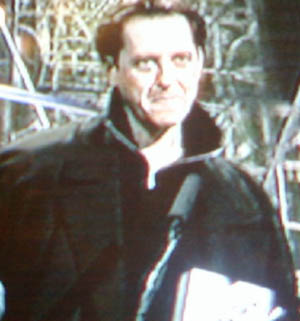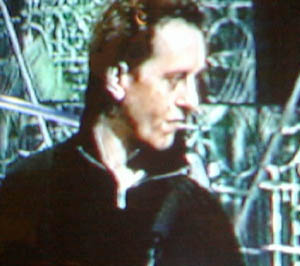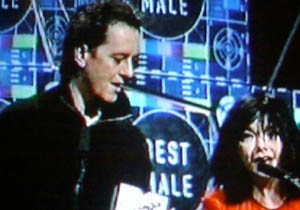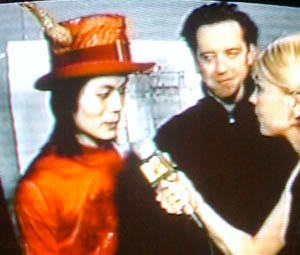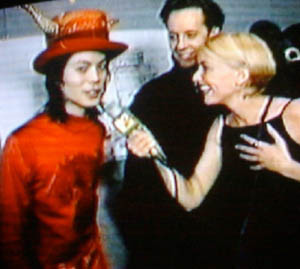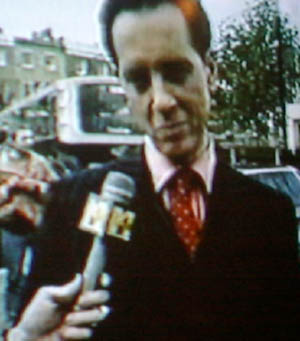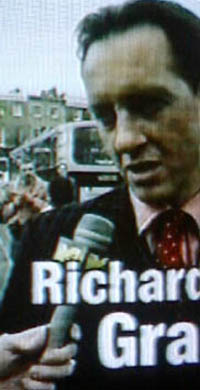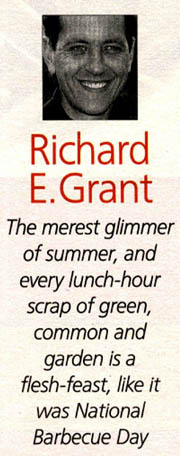Comment: Grant
Oxford University Trinity Magazine – Issue 5, 1996
Withnail star Richard E Grant talks to Justin Huggler
Richard E Grant is in danger of becoming an annual fixture at the Union. His last visit was so successful that the moment he set foot back in Oxford to give a reading from his newly published diaries, he was whisked off to the Union debating chamber for an encore performance.
I find Grant posing for a gaggle of photographers, effortlessly alternating between charming grin and suave moodiness, but with an air of slight embarrassment throughout the whole proceedings.
He looks surprisingly old and sombre. There is none of that sprightly charm that typifies his big screen performances. He has the tall figure of Withnail, but not his extrovert flamboyance.
Here is the actor without his make-up, shy, quietly-spoken and, it seems, nervous at the prospect of performing to the Union. He tells me that he is worried that no-one will come, because he was here so recently.
When I suggest that his last appearance here was so good he should consider a second career as a professional raconteur he seems astonished: “I think Ned Sherrin was the last of the people to do that for a living.” He insists that he found his last Union appearance easy, because he was talking about what he does for a living. “It’s not like I’ve been asked to come here to speak about the works of Chekhov or Bulgakov.” When a comparison to Kenneth Williams is suggested, he grins: “There are no Carry On films for me to be in”. He then rejects the comparison: “Williams was innately funny.”
So, what about acting? How does Grant view his profession? “Entertainment. No more, no less; that’s what it is. You can say that something can change someone’s life. You can get intellectual about it and say it’s a mirror up to nature, it can change the way people think, and all those noble things. But it seems to me that when people set out to try to do that, the end product is so worthy and so boring and dull as a result.”
Grant warms to his theme, his intelligent and enthusiastic analysis bizarrely punctuated by self-conscious pauses. “But the thing that has no gravitas, or subterranean subtext, or whatever you want to call it, can each people’s hearts.”
Yet Grant seems unaware of just how much his performances have reached some people’s hearts. He says that his status as poster icon, as the drunken out-of-work actor Withnail, is “news to me”. Self-effacingly he points out that he got the part when Daniel Day-Lewis turned it down.
It was Grant’s big break: the cult film transformed him from unknown actor to international film star.
Since making Withnail and I, Grant has worked with Hollywood giants, such as Robert Altman on The Player and Prêt à Porter, and appeared on the West End stage, alongside Maggie Smith, in The Importance of Being Earnest.
Yet he eschews any credit for creating the character: “I didn’t write a single word of dialogue.” He points out that Withnail was entirely the creation of writer-director Bruce Robinson, who based the character on a friend of his. Grant considers himself “lucky” to have had the chance to play the part.
When questioned as to whether he’d like to be involved on the other side of the camera, Grant reveals that he is writing a film script. However, he stresses that this is not an attempt to compete with Bruce Robinson. It is “a comic drama”, for which Grant is trying to find financial backing and a producer. He wants to direct the film himself, and to make it here in Britain.
He in fact has experience of directing: he directed as a student, and then spent two years directing plays for a theatre he co-founded when he left university. So what of his early years, trying to forge a career as an actor? “The advice that I was given all through my childhood was: ‘You will never do it; you can’t do it; you will never do it. Who do you think you are?’ I wanted to be an actor, and it’s negativity that strengthened my resolve to do it. If you’re going to do it, you’ll do it, no matter what. Whether you’re successful in other people’s eyes is something you can’t really exert much control over.”
As for the future, Grant concedes that if he gets his film off the ground it may “change my entire working life”, but for now he’s an actor, and he loves it. “It’s fantastic fun. Obviously it’s crammed with self-doubt and you get knocked about in films, but at the same time you get huge rewards.”
Although he is interested in writing and directing, he is defensive about the acting profession: “I love movies and I love the theatre. They’re the life that I’m involved in. It always strikes me as odd that, on the one hand, actors are particularly vilified for being luvvies, or whatever, but if you read any magazine, newspaper or birthday list, the people they bother to write about are very often entertainers. Whether it’s because people don’t believe in God any more, I don’t know.”
On the technical side of acting, Grant is uninterested in “the method” or similar formulaic approaches. He does, however, stress that it is a “hands-on, active” process: “If you learn the lines, that in itself involves having to do something. I’ve not found anybody who can really define precisely how it works. Your particular personality may work in conjunction with the writing. If the two things combine and work together, then a sort of combustion takes place. As soon as you start talking about it you get into cookery or industrial terms.”
At this point, Richard E Grant is summoned away to the Union chamber. He sighs and his face creases with what can only be tension. Walking through the corridors of the Union buildings, he pauses to expel a Withnailesque roar of preparation, then plunges in. As the glare of the chamber lights catches his face, the muscles are relaxed, the tension has disappeared. The low, quiet voice of the interview subject becomes the high, clear voice familiar to cinema-goers, the face is young and smiling again. The actor is performing. The actor is back in his element.
©1996 Oxford Student Publications Limited
 The REG Temple is the official website for actor, author and director Richard E. Grant.
The REG Temple is the official website for actor, author and director Richard E. Grant.

